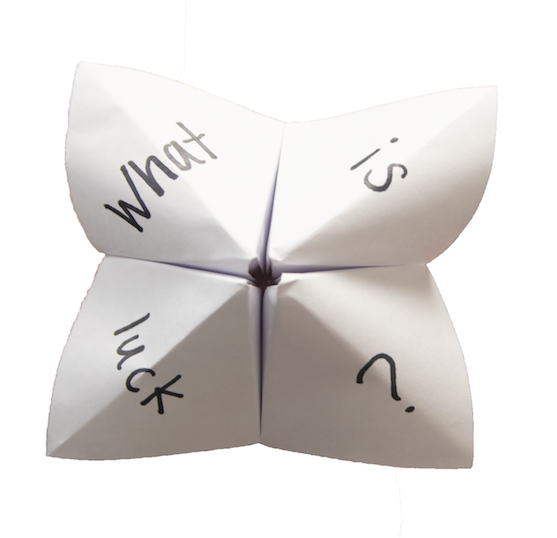A stroke of luck
MVHS students and experts examine luck and how it influences their lives

November 21, 2018
Spraining her wrist and ankle, getting a concussion and running her car over her own foot was all it took for senior Amanda Wilson to believe in luck. There was one thing in common with in all these unfortunate mishaps: Wilson was not wearing her lucky necklace and ring.
WHAT IS LUCK?
Luck is defined by the Oxford dictionary as “the success or failure apparently brought by chance rather than through one’s own actions.” However, many have formed their own definitions of luck and opinions on the existence of luck through personal experiences and religious beliefs.
Duncan Pritchard, a Chancellor’s professor of philosophy at the University of California, Irvine and the author of “Epistemic Luck” explains that there are various definitions about luck. He defines luck as an event that could have easily had another outcome that didn’t occur.
“My own view is that an event is lucky when it could have very easily not happened — i.e., not much would need to have happened for it not to occur,” Pritchard wrote in an email. “So if you’re lucky not to have been hit by a sniper’s bullet, that’s because you very easily could have been (e.g., the bullet just needed to be a few inches to the left).”
The idea that luck is an event solely brought by the high probability of something not happening portrays the sentiment as a quick instance with not much build up. Dr. Tina Seelig, a faculty director of the Stanford Technology Ventures Program and Ph.D. from Stanford University Medical School in Neuroscience, explains in her TED talk “How to catch luck” that this way of thinking isn’t entirely accurate.
“I’ve realized, by watching so long, that luck is rarely a lightning strike, isolated and dramatic. It’s much more like the wind, blowing constantly,” Seelig says. “Sometimes it’s calm, and sometimes it blows in gusts, and sometimes it comes from directions that you didn’t even imagine.”
There is something predestined about the concept of luck, but that moment when a person examines their luck builds up. Small details build and overlap to create this instance where even the unexpected occurs.
Like Pritchard, senior Sean Crofut believes in luck and describes it as a series of random coincidences. He defines luck with an anecdote regarding a “SpongeBob” episode.
“SpongeBob opens all the packs but doesn’t get the cards he wants,” Crofut said. “Patrick opened the last one [and] he gets that card. For me, that’s luck.”
Like Crofut, sophomore Eesha Ramkumar is able to define her idea of luck with a personal experience — but she herself does not believe in luck. Through her personal experiences, she has concluded that being lucky simply means being in the right place at the right time. It was through studying and taking tests that she realized the outcome was a direct reflection of her work ethic.
“I believe that you work for whatever you get. Like studying for a test, I don’t believe that you will just do well; you can’t solely rely on luck,” Ramkumar said. “I feel like luck is just false hope. So, by working harder, you do better.”
Luck isn’t a simple term; there are many aspects that come into play when someone finds themselves in an unexplainable position. Some would give credit to their luck instead of other underlying factors.To many, life isn’t completely predetermined, and Seelig backs this idea up in her TED Talk as well.
“Now, you might say, ‘Oh, you’re so lucky.’ But of course I was lucky, but that luck resulted from a series of small risks I took, starting with saying hello. And anyone can do this, no matter where you are in your life, no matter where you are in the world,” Seelig said.
Like Ramkumar, freshman Rishi Desai believes that luck does not exist and that people should not solely rely on luck for good things to happen. Disregarding luck as a possible force behind an event, Desai believes that it is a person’s individual actions and proactive decisions that lead to a certain outcome; in his view, there is no such thing as a random coincidence.
“Your actions either benefit or doesn’t benefit you,” Desai said. “I don’t believe in luck because it doesn’t happen that often and luck is not something that just happens. You can’t depend on luck; it all matters on what you do.”
With these varying opinions on luck, Pritchard notes that luck is often confused with other related notions such as chance or fortune. Both fortune and chance are very similar to luck: being fortunate often means that you create your own luck while chance is the objective reality of random outcomes in the real world. According to Arts Journal, luck is chance viewed through the spectacles of good or bad fortune.
“Something that is down to chance might make it lucky, but it might not. So perhaps there’s a small chance that the plane might crash, but that doesn’t by itself make it lucky that you aren’t in a plane crash—it depends on whether this is something that could easily occur,” Pritchard wrote. “Fortune is another. I’m fortunate to be born in a wealthy country with good health and so forth. We might loosely say that I’m lucky, but we’re not using the word in the same way— I couldn’t have easily been born in another country. The right term to use is, I think, that I’m fortunate.”
EXPERIENCES WITH LUCK
Wilson, however, considers herself not fortunate, but lucky. Her luck stems from her two pieces of jewelry – a necklace and a ring. Wilson has found herself vulnerable to countless amounts of injuries over the summer when she was not wearing her lucky ring and necklace. She is now accustomed to regularly wearing these pieces of jewelry to avoid bad luck. She found that whenever she has worn the two, she was never on the receiving end of bad luck.
She received her lucky silver necklace from her grandmother at the age of four when she was a flower girl at a wedding. The necklace is dear to her as it holds an emotional connection to her grandmother. The ring, which she received one year ago, has her birthstone, Alexandrite, in it.
“I’ve had a lot of injuries and all of them have happened when I wasn’t wearing them,” Wilson said. “Over the summer, all the times I didn’t wear it, I sprained my wrist and then I sprained my ankle, and then I ran over my other leg with my car. I got a concussion too. But I whenever I wear it, I have amazing luck.”
Wilson is one of many who believe in lucky objects. According to a survey of 368 students, 28 percent have good luck charms.
Crofut also has been graced with the misfortunes and fortunes of random chance but believes that overall he is lucky.
“Where I was born [is lucky] first of all,” Crofut said. “This society is very high up, we are like the top 1 percent rich people and then also being able to be here is just lucky for me.”
Although Crofut considers his life to be overall lucky, junior Shreya Patibanda recalls how she has had bursts of luck throughout her life. She credits luck to the many times in her life when she asks for something and then it happens without an explanation.
She recalls one day, when she lived on the East Coast where school was out for the day due to the snow. That one day she had off from school had her asking for more, and to her luck she got another day off, and four more following soon after.
These experiences with a stroke of luck come into play when students decide whether they believe in luck or not.
EXAMINING THE OTHER SIDE
While most MVHS students are steadfast in their beliefs regarding luck, they do acknowledge the other perspective and provide insight as to why others may or may not believe in luck. Some may not believe in luck because they believe that everything happens for a reason, similar to destiny. According to a survey of 362 students, 55 percent believed in destiny.
Ramkumar believes that others may believe in luck to have hope during moments of sufferings and hardships. It’s a way for them to keep persevering through strife. Patibanda mentions that this same idea could be applied to destiny.
“I do think when people are going through like bad times and suffering it’s helpful for them to believe in destiny because they find meaning in the suffering,” Patibanda said. “They think that whatever suffering they’ve gone through … happened for a reason.”
While luck and destiny may seem similar at first, they are inherently different. According to Patibanda, people believe in luck when something is unexplainable while destiny means that there is a reason for everything.
In some cases, religion appears to be a influencing factor. For example, Crofut mentions that people who do not believe in luck often want to structure the events of their life to the idea that everything happens for a reason, usually influenced by religion.
Ramkumar, as stated previously does not believe in luck, mentions the concept of karma, a Hindu and Buddhist belief that all actions have accompanying consequences, does not influence her idea of luck. She thinks that this philosophy is a mechanism used to control others to do good things. From a survey of 245 religious students, 51 percent believe that their religion affects their idea of karma. Karma can be seen as the product of an individual’s actions in life and luck can be seen as the the interaction of karmas.
Patibanda, who is also a Hindu, does not believe in karma, because she does not believe in the importance of morals. She feels that an action that may seem right to one person might be wrong to another, emphasizing how morals differ from person to person, and therefore karma cannot exist. She mentions an idea from “Inherit the Wind,” a movie depicting the Scopes Trial, to show that morals are constantly changing.
“This teacher is teaching evolution to the students,” Patibanda said. “You’re not allowed to do that because it’s against Christian beliefs, which is that the universe was created in seven days; and that was a humongous issue. It’s surprising to us now, because — isn’t it obvious evolution is true? That shows an example of how morals change over time.”
The idea of luck is interconnected with many other beliefs within religion, personal definitions of destiny and chance, and morals which seem to dictate a person’s view of luck. Whether they believe in luck or not, MVHS students have defined it with their own experiences and beliefs. Luck comes in all kinds of aspects in a person’s life, whether it is good or bad luck. Like all other subjects in the world, luck isn’t simple, sometimes there needs to be a push.
“So, yes, sometimes people were born into terrible circumstances, and sometimes, luck is a lightning bolt that hits us with something wonderful or something terrible,” Seelig said. “But the winds of luck are always there, and if you’re willing to take some risks, if you’re willing to really go out and show appreciation and willing to really look at ideas, even if they’re crazy, through the lens of possibilities, you can build a bigger and bigger sail to catch the winds of luck.”

















